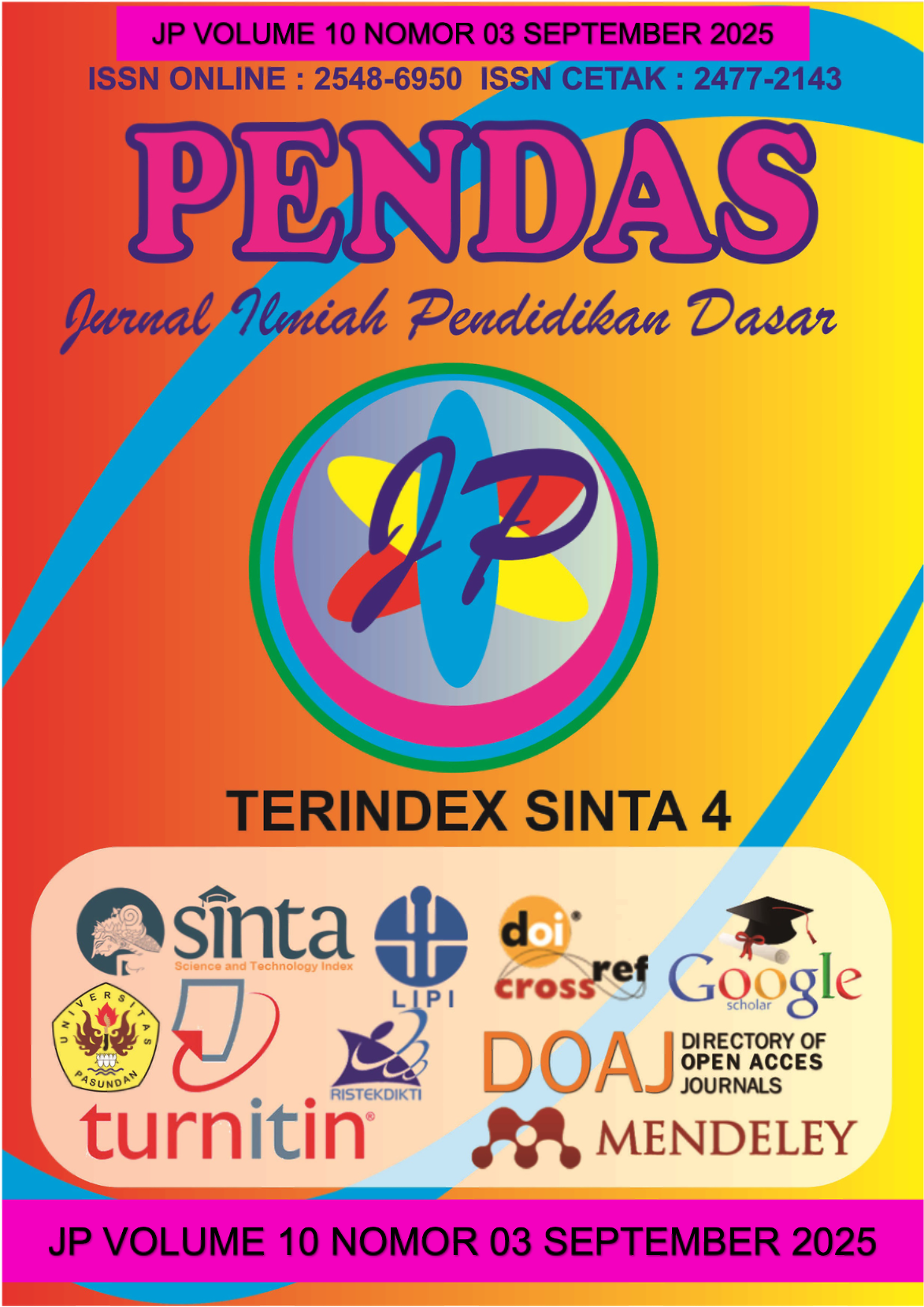PENGARUH PROJECT-BASED LEARNING (PJBL) TERHADAP KETERAMPILAN SISWA PADA PEMAHAMAN BERITA DI SMP NEGERI 2 SIBOLANGIT TAHUN PEMBELAJARAN 2025/2026
DOI:
https://doi.org/10.23969/jp.v10i03.32674Keywords:
Project-Based Learning, news comprehension skills, post-test-only control group, learning outcomes, junior high schoolAbstract
This study aims to determine the significant effect of implementing the Project- Based Learning (PjBL) model on the news comprehension skills of eighth-grade students at SMP Negeri 2 Sibolangit in the 2025/2026 academic year. The research employed a post-test-only control group design with a sample of 59 students divided into two groups: 29 students in the control class and 30 students in the experimental class. The research instrument was a test administered to 59 students and validated by experts. The normality test showed that the control class obtained a statistic value of 0.166 with a significance (p-value) of 0.364, while the experimental class obtained a statistic value of 0.127 with a significance of 0.200, indicating that both significance values were above the 0.05 threshold and thus normally distributed. The homogeneity test using Levene’s Test showed a Levene Statistic value of 3.695 with a significance (Sig.) of 0.060 based on the mean approach. Since the significance value was greater than 0.05, it can be concluded that the variances between the experimental and control classes were homogeneous. The t-test result showed t = 11.798 (df = 57) with Sig. 0.000 < 0.05, indicating a significant difference between the experimental class (mean = 88.66) and the control class (mean = 66.62). The mean difference of 22.03 (95% CI: 18.18–25.89) indicates that the learning applied in the experimental class significantly improved students’ learning outcomes.
Downloads
References
Fauzan, R. (2021). Project-Based
Learning sebagai strategi pembelajaran dalam meningkatkan literasi berita di era digital. Jurnal Literasi dan Media, 9(2), 77- 91.
Huda, M. (2020). Model Pembelajaran
Inovatif. Yogyakarta: Pustaka Pelajar.
Kasali, R. (2019). Disrupsi. Gramedia
Pustaka Utama.
Krajcik, J., & Blumenfeld, P. (2006).
Pembelajaran berbasis proyek. Dalam
R. K. Sawyer (Ed.), Panduan
Cambridge tentang Ilmu Pembelajaran
(hal. 317-334). Cambridge University Press.
Mustofa, A., & Rahayu, I. (2023).
Analisis efektivitas pembelajaran berbasis proyek dalam meningkatkan berpikir kritis siswa SMP. Jurnal Pendidikan Inovatif, 17(3), 89-105.
Muttaqin, A., Maulani, R., & Wahyuni,
I. (2020). Penerapan Project-Based Learning untuk Meningkatkan Literasi Informasi di Sekolah Dasar. Jurnal Pendidikan Dasar Nusantara, 5(1), 65–74.
Paul, R., & Elder, L. (2014). Panduan
Mini untuk Konsep dan Alat Berpikir Kritis.
Foundation for Critical Thinking.
Piaget, J. (1972). The Psychology of the Child. New York: Basic Books.
Rahmawati, N. (2022). Efektivitas
PJBL dalam meningkatkan pemahaman berita siswa. urnal Pendidikan dan Kebudayaan, 15(3), 90-105.
Rohmah, A. N., & Yuliati, Y. (2019).
Penerapan Model Project-Based Learning untuk Meningkatkan Hasil Belajar Bahasa Indonesia Siswa SMP. Bahasa dan Seni: Jurnal Pendidikan Bahasa dan Sastra, 47(1), 25–35.
Santoso, D. (2022). Perbandingan
pembelajaran konvensional dan aktif dalam meningkatkan berpikir kritis siswa. Jurnal Ilmu Pendidikan, 18(4), 112-125.
Saputra, D., & Wijayanti, R. (2023).
Pengaruh PjBL terhadap keterampilan berpikir kritis siswa SMP dalam pembelajaran Bahasa Indonesia. Jurnal Pendidikan Bahasa dan Sastra, 15(1), 30-45.
Saragih, R. S. (2021). Pengaruh
Model Pembelajaran Project-Based Learning terhadap Kemampuan Menulis Teks Berita Siswa. Jurnal Pendidikan Bahasa dan Sastra Indonesia, 11(2), 112–120.
Sugiyono. (2017). Metode Penelitian
Kuantitatif, Kualitatif, dan R&D.
Alfabeta.
Susanto, B. (2023). Implementasi
model PJBL dalam meningkatkan keterampilan analisis berita siswa sekolah menengah. Jurnal Kajian Pendidikan, 19(1), 67-82.
Thomas, J. W. (2000). Tinjauan
Penelitian tentang Project-Based Learning. The AutodeskFoundation
Thomas, M. (2021). Pembelajaran
Berbasis Proyek dan Keterlibatan Siswa. Educational Research Review, 30, 100357.
Wibowo, T. (2023). Pembelajaran
Berbasis Proyek Dalam Meningkatkan Pemahaman Berita Siswa SMP. Jurnal Inovasi Pendidikan, 10(2), 112-130.
Vygotsky, L. S. (1978). Mind in
Society: The Development of Higher Psychological Processes. Cambridge, MA: Harvard University Press.
Ennis, R. H. (1989). Critical Thinking
and Subject Specificity: Clarification and Neeed Research. Educational Researcher, 18(3), 4–10.
Ennis, R. H. (2018). Critical Thinking
Across the Curriculum: A Brief Edition of The Nature of Criticial Thinking Topoi, 37(1), 165-18343.
Wibowo, T. (2023). Pembelajaran
Berbasis Proyek Dalam Meningkatkan Pemahaman Berita Siswa SMP. Jurnal Inovasi Pendidikan, 10(2), 112–130. (Tidak tersedia versi daring langsung, namun kamu bisa mencantumkan jurnal lokal atau kampus jika ada akses.)
Thomas, J. W. (2000). A Review of
Research on Project-Based Learning. The Autodesk Foundation.
Sudaryanto. (2015).Pembelajaran
Bahasa Indonesia dalam Kurikulum 2013. Yogyakarta
Sumadiria, R. S. (2005). Bahasa
Jurnalistik: Panduan Praktis Penulisan Berita dan Feature. Bandung: Simbiosa Rekatama Media.
Brookhart, S. M. (2010). Howto
Assess Higher-Order Thinking Skills in Your Classroom. ASCD.
Bell, S. (2010). Project-Based
Learning for the 21st Century: Skills for the Future. The Clearing House,83(2), 39–43.
Paul, R., & Elder, L. (2014). The
Miniature Guide to Critical Thinking: Concepts and Tools.FoundationforCritical
Krajcik, J. S., & Blumenfeld, P. C.
(2006). Project-Based Learning. In R. K. Sawyer (Ed.), The Cambridge Handbook of the Learning Sciences (pp. 317–334). Cambridge University Press.
Sugiyono. (2019). Metode
PenelitianPendidikan: Pendekatan Kuantitatif, Kualitatif, dan R&D. Bandung: Alfabeta
Downloads
Published
Issue
Section
License
Copyright (c) 2025 Pendas : Jurnal Ilmiah Pendidikan Dasar

This work is licensed under a Creative Commons Attribution 4.0 International License.














































